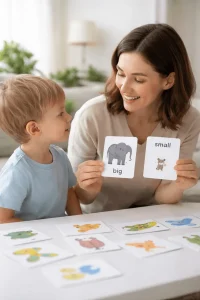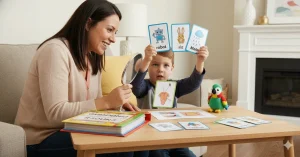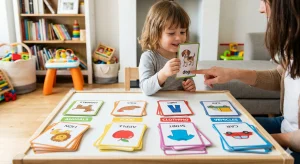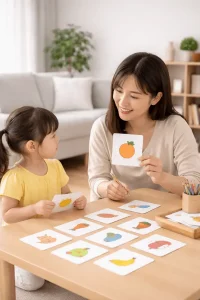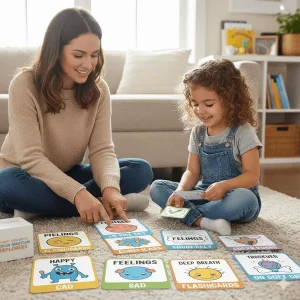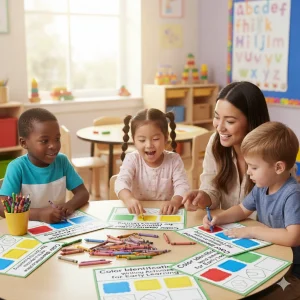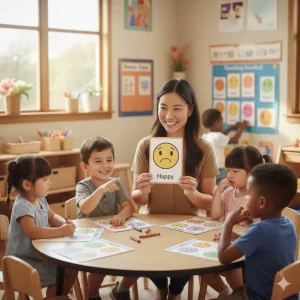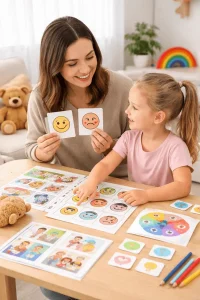My Baby Isn’t Talking Yet? Signs of Speech Delay & Solutions
By Rajini D
Last Updated: June 16, 2025
I used to think silence was peaceful — until I started worrying about my baby’s silence. While other toddlers babbled, pointed, and said “mama,” mine stayed mostly quiet. At first, I told myself, “Every child develops at their own pace.” But deep down, I couldn’t shake the feeling that something wasn’t quite right. If you’re feeling this too — wondering why your baby isn’t saying any words yet — please know you’re not alone. Many parents notice something feels off long before anyone else does. And that’s not being overly cautious — it’s called being tuned in.
It’s normal to have questions. Is this delay just a phase? Should I wait it out? Or is it time to act?
Worried your child isn’t talking yet? Get expert help with online speech therapy for kids — personalized, convenient, and trusted by parents worldwide
What’s Typically Expected: Baby Speech Milestones
If your baby isn’t saying any words yet, it’s natural to wonder what’s considered “normal” for this stage. While every child grows at their own pace, most babies and toddlers start showing early communication skills between 12 and 24 months.
Here are a few signs of typical speech and language development during that time:
- Responds to their name — You call, and they turn to look at you (usually by 9 to 12 months).
- Uses gestures — Waving “bye-bye,” pointing to things they want, or lifting arms to be picked up.
- Says a few simple words — Like “mama,” “dada,” “ball,” or even animal sounds like “moo.”
- Follows your gaze or simple directions — When you say “look at the cat” or “give me the toy,” they try to respond.
- Mimics sounds and actions — Repeating funny noises, copying claps, or imitating what you say (even if it sounds off!).
Some babies hit these milestones early, and others take more time. But if you’re noticing a lack of words and these behaviors aren’t showing up either, it might be time to check in.
At this stage, communication includes so much more than just words. Gestures, eye contact, and shared attention are important building blocks. When those pieces are missing, it may be more than a speech delay — and that’s worth gently exploring.
When to Be Concerned
If you’re wondering whether your baby’s quietness is just part of their personality or something more, you’re not alone. Many parents feel unsure — especially when friends or family say, “They’ll talk when they’re ready.”
While late talking can be normal, certain signs may suggest your child could benefit from extra support. These aren’t meant to alarm you — think of them as gentle clues that it might be time to look a little closer.
Watch for (Around 16–24 Months)
| Sign | What It Might Look Like |
|---|---|
| No spoken words | By 16–18 months, your child isn’t saying even basic words like “mama” or “ball.” |
| Poor eye contact | They don’t often look at you, even during play or when you call their name. |
| No response to name | You call them, but they don’t turn or react consistently. |
| No gestures | No pointing, waving, or reaching to communicate wants or share attention. |
| No imitation | Doesn’t copy facial expressions, sounds, or actions like clapping or waving. |
| Limited interest in people | They seem more engaged with objects than with people around them. |
If your baby isn’t saying any words yet and you’re noticing some of the signs above, it’s okay to pause and explore further. This doesn’t mean something is “wrong” — it simply means your child may need a little extra help with communication.
Read More: How to Identify and Help Your Child Overcome Speech Delays
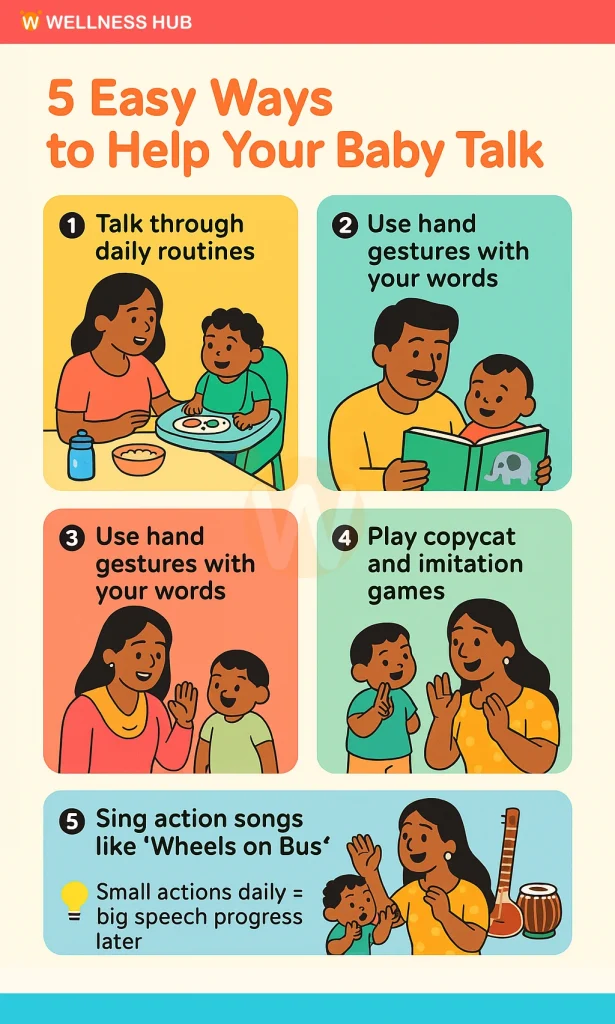
What You Can Do at Home: Simple, Everyday Boosts
If your baby isn’t saying any words yet, there’s good news — you don’t have to wait and watch helplessly. There are simple, everyday things you can do at home that can gently encourage your child’s communication.
These strategies don’t require fancy tools or long sessions. They’re small, consistent actions that fit right into your daily routine — and they make a bigger difference than you might think.
Ready to support your baby’s first words at home? Try our expert-designed activity: First Word Identification Game
Easy Ways to Support Speech at Home
1. Narrate Your Daily Routines
Talk to your child during ordinary activities — getting dressed, eating, or playing. Describe what you’re doing in short, clear sentences.
“We’re putting on your shoes. One shoe, two shoes! Ready to go!”
This constant exposure to language helps your child connect words with actions and objects.
2. Read Picture Books Every Day
Choose simple, colorful books with big pictures. Point to each image and name it slowly:
“Dog. The dog is running. Woof woof!”
Repetition builds vocabulary, even if your child isn’t speaking yet. Let them turn pages, point, or react — every interaction counts.
3. Use Gestures While Talking
Pair your words with actions. Wave when you say “bye,” nod when you say “yes,” and point to things as you name them. This builds understanding and encourages your child to respond nonverbally at first — which is a key step toward speech.
4. Play Imitation Games
Copy your child’s sounds, claps, or facial expressions — and encourage them to copy yours. Make it fun and playful:
You clap, then wait. You make a silly face, then pause for them to try it.
Imitation is how babies start learning the back-and-forth of conversation.
5. Sing Simple Action Songs
Songs like “Wheels on the Bus” or “If You’re Happy and You Know It” use repetition, rhythm, and movement — all great for speech development. Add gestures or hand motions to make them even more engaging.
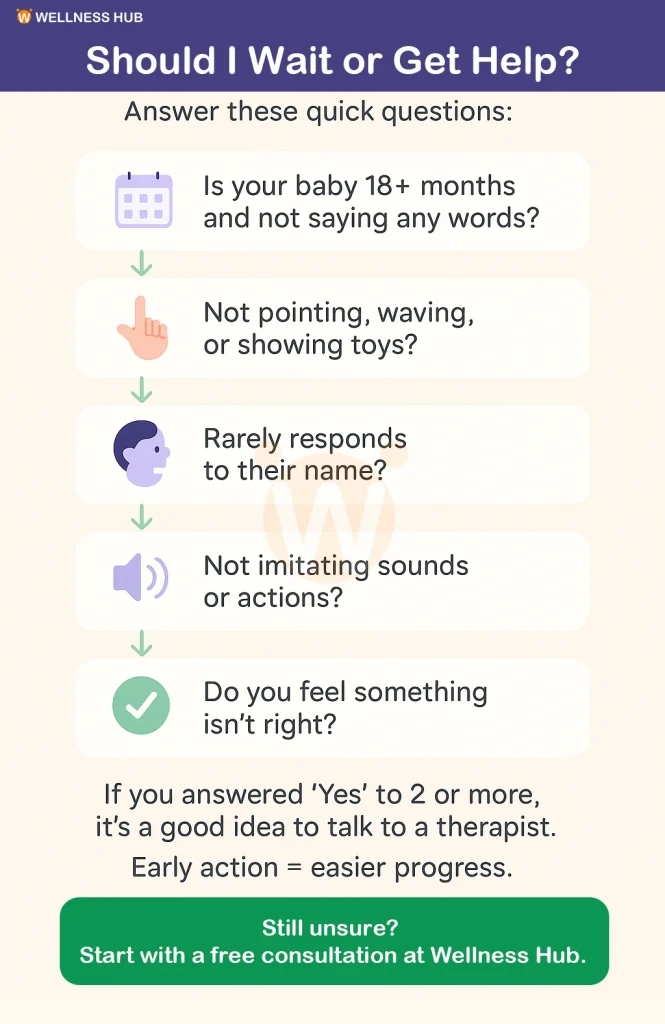
How Wellness Hub Can Help
If your baby isn’t saying any words yet and you’re not sure what to do next, you don’t have to figure it out alone. Sometimes, having a calm, caring expert by your side makes all the difference.
At Wellness Hub, we specialize in helping babies and toddlers with speech and language delays — especially in Indian families, both in India and abroad. We know how overwhelming it can be to navigate early concerns, so we’ve made support simple, personal, and accessible from anywhere.
Here’s how we can support you:
1. Online Therapy with Licensed Experts
Our certified speech-language pathologists work one-on-one with your child through secure video sessions. You’ll see real progress, guided by someone who understands your concerns and goals.
2. Personalized, 1-on-1 Sessions
No two children are the same — and neither are our plans. We tailor every session to your child’s needs, pace, and communication style.
3. Therapist-Led Screening Tools
Not sure where your child stands? Our expert-designed screeners help identify areas of strength and concern — giving you clarity without long wait times.
4. Culturally Sensitive Care for Indian Families Worldwide
Whether you’re parenting in India or raising your child abroad, our team respects your language, culture, and values. We make sure you feel heard, supported, and never judged.
Gentle Encouragement: Trusting Your Parental Instincts
If your baby isn’t saying any words yet, it’s easy to fall into a spiral of self-doubt. Maybe you’ve heard things like “Every child talks in their own time” or “Boys usually talk late” — and while there’s some truth in those, they’re not the full story.
The truth is: child development isn’t one-size-fits-all. Some toddlers chatter nonstop by 18 months, while others take longer to find their voice. That variation is normal. But when something in your gut says, “I think my child needs help,” — that feeling deserves respect.
Trusting your instincts doesn’t mean you’re jumping to conclusions. It means you’re paying attention.
Asking questions, seeking answers, and reaching out for support isn’t overreacting — it’s parenting with intention.
You’re not “overthinking” — you’re parenting with love.
And love means being open to help, even before a formal diagnosis or label. You know your child better than anyone. If you’re seeing signs that feel off — even if others don’t notice them yet — it’s more than okay to explore next steps.
Conclusion
You’re Not Alone — And You’re Not Too Late. If your baby isn’t saying any words yet, the most important thing to remember is this: you are not alone — and you are not too late. Parenting comes with a thousand questions, but some of the most powerful answers begin with simply trusting yourself. You’ve noticed something. You’ve asked questions. You’ve looked for support. That means you’re already doing something right. No two children develop the same way, and no one expects you to have all the answers. What matters most is being open, proactive, and gentle — with your child and with yourself. At Wellness Hub, we’re here to walk this journey with you. Whether you’re ready for a free consultation, want to explore home strategies, or just need someone who gets it — we’re here.
Let’s take the next step, together. With clarity. With compassion. And with your child’s voice at the heart of it all.
Frequently Asked Questions:
1. Is it normal if my baby isn’t saying any words yet at 1 year old?
Some babies talk later than others. But if your baby isn’t saying even simple words like “mama” or “dada” by 12–15 months, it’s a good idea to keep an eye on other signs like gestures, eye contact, and response to name.
2. When should I worry if my baby has no words yet?
If your child isn’t using any words by 16 to 18 months and also doesn’t point, imitate, or respond to their name, it may be time to talk to a speech therapist for support.
3. What causes speech delay in babies?
There can be many reasons — hearing problems, lack of social interaction, or sometimes developmental delays. Every child is different, and a professional can help find the cause.
4. What should I do if my baby isn’t talking yet?
Start by talking to your baby often, reading picture books, using gestures, and playing face-to-face games. If there’s still no progress, consider a speech screening. You can book a free consultation with a therapist at Wellness Hub.
5. Can a baby understand things even if they don’t speak?
Yes! Many babies understand words before they can say them. But if your baby doesn’t respond to your voice or follow simple instructions, that may be a sign to look deeper.
6. What’s the difference between a late talker and a speech delay?
A late talker usually understands language well and uses gestures but speaks fewer words. A speech delay may also include trouble understanding, social interaction, or using gestures.
7. How can I help my baby talk faster at home?
Talk to them often, describe daily tasks, sing songs, and read picture books. Use gestures while speaking and repeat simple words. These small steps help babies connect words with meaning.
8. Should I wait or get help if my baby isn’t talking?
Waiting too long can delay progress. Early support makes a big difference. If you’re worried your baby isn’t saying any words yet, it’s smart to talk to a therapist sooner rather than later.
9. Does online speech therapy work for babies and toddlers?
Yes, it can! Online therapy is playful, parent-involved, and works well even for young children. At Wellness Hub, we guide you with fun and simple ways to support your child at home.
10. Can speech delay be fixed with therapy?
In many cases, yes. With the right help, lots of children catch up. Speech therapy gives your baby the tools they need to express themselves better — step by step.
About the Author:
Rajini Darugupally
M.Sc., Speech-Language Pathologist (9+ years of experience)
Rajini is a passionate and dedicated Speech-Language Pathologist with over 9+ years of experience, specializing in both developmental speech and language disorders in children and rehabilitation in adults. Driven by a desire to empower each individual to find their voice, Rajini brings a wealth of experience and a warm, genuine approach to therapy. Currently, at Wellness Hub, she thrives in a team environment that values innovation, compassion, and achieving results for their clients.
Book your Free Consultation Today
Parent/Caregiver Info:
Client’s Details:
* Error Message
